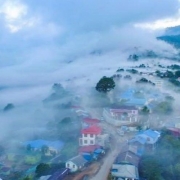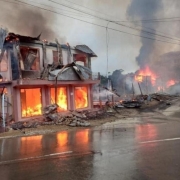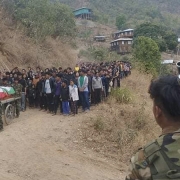More than 160 homes burn down in junta shelling of Chin State town
Two of Thantlang’s churches also caught fire, and some 20 children are feared to be trapped in an orphanage in the besieged town
Amid an escalation of both armed resistance to military rule and reprisals from the junta forces, Myanmar army troops shelled the largely deserted western Chin State town of Thantlang on Friday, causing fires that destroyed more than 160 of the town’s 2,000 homes.
The attack came after a junta soldier was shot dead at 9:30am by the Chinland Defence Force (CDF)—which has been monitoring the situation in Thantlang—after members of the local resistance group said they saw him looting a shop.
In retaliation for the killing, the junta’s armed forces occupying the area shot at least 10 rounds of artillery into the town, which started fires upon exploding. Within an hour, several troops had arrived at the location at which the soldier was killed and also began torching houses “for no reason,” a CDF spokesperson said.
“They walked into the town at around 10:30am and torched the houses at random,” the spokesperson from the CDF’s Thantlang chapter told Myanmar Now.
By 5pm, at least 40 houses had burnt down, with the fires continuing to burn throughout the night, he said.
 Caption- Smoke is seen rising after the military’s artillery shells were fired at and exploded in Thantlang on Friday afternoon (The Chinland Post)
Caption- Smoke is seen rising after the military’s artillery shells were fired at and exploded in Thantlang on Friday afternoon (The Chinland Post)
A man who lives near Thantlang told Myanmar Now that there was “still smoke coming out” of the town on Friday evening.
By 9am Saturday morning, the fire had died down but homes were still smoldering, according to the Zalen news outlet.
The Thantlang CDF took note of the estimated 160 houses that were destroyed and at the time of reporting were still notifying the homeowners, the group’s spokesperson said.
The Church on the Rock, the Presbyterian church, and a building attached to the Thantlang Baptist Church—the town’s largest congregation—also caught fire in the shelling, the Chin Human Rights Organisation (CHRO) said in a statement on Friday night.
International non-profit organisation Save the Children also reported that their local office in Thantlang was destroyed in the fire.
Nearly all of Thantlang’s 8,000 residents fled following military assaults that destroyed 18 homes and a government building in September. This too was seen as a retaliation against the public and the resistance after an attack by the CDF and the Chin National Army on a junta base reportedly killed some 30 soldiers.
Thousands of the civilians displaced from Thantlang have been taking shelter in villages along the India-Myanmar border, with others crossing into India’s Mizoram State.
At least three people, including two elderly women, were known to have stayed behind in Thantlang after others had fled. Myanmar Now was unable to contact them on Friday after the military shelling.
 Caption- Smoke is seen rising after the military’s artillery shells were fired at and exploded in Thantlang on Friday afternoon (The Chinland Post)
Caption- Smoke is seen rising after the military’s artillery shells were fired at and exploded in Thantlang on Friday afternoon (The Chinland Post)
In their Friday statement, CHRO reported that more than 20 children and their teachers had stayed behind in an orphanage located at the entrance to Thantlang and remained trapped.
“The extensive destruction of civilian property, carried out wantonly and not justified by any military necessity, represent war crimes and grave breaches of international humanitarian law,” CHRO’s Salai Za Uk Ling said in the statement. .
Salai Issac Khen, a former municipal minister of Chin State under the National League for Democracy administration ousted in Myanmar’s February 1 coup, condemned the shelling on Friday in a Facebook post blaming the military for the destruction after rumours circulated that the residents of Thantlang were somehow responsible for the blaze.
“It is not easy to build a house in the Chin hills. The Chin people do not have any reason to torch their own homes,” he wrote.
On Sunday, junta mouthpiece the Global New Light of Myanmar accused the PDF burning the homes in Thantlang and committing “terrorist acts.” Military council spokesperson Gen Zaw Min Tun also said in a statement on Sunday that the local PDF—encouraged by the shadow National Unity Government and living “under the cover of [the] people”—had started the fire and that the military was unable to extinguish it.
In September 2017, following a scorched earth military campaign against the Rohingya population of Rakhine State—south of Chin State—the Myanmar army and government infamously accused the fleeing Rohingya of burning down their own homes. The claim was widely dismissed by the refugees themselves, human rights groups and the international community, and later submitted to a UN court as evidence of genocide.
“The military council will go down in history as responsible for this fire in Thantlang today,” Salai Issac Khen wrote, and urged all ethnic Chin members of the military council to “immediately resign.”
Around 200 troops from the military’s Light Infantry Division 11 and Light Infantry Battalion 269 based in the Chin State capital of Hakha have been stationed on a hill overlooking Thantlang, according to the CDF.
“We will take our town back,” the Thantlang CDF spokesperson said.
 Caption- Smoke is seen rising after the military’s artillery shells were fired at and exploded in Thantlang on Friday afternoon (The Chinland Post)
Caption- Smoke is seen rising after the military’s artillery shells were fired at and exploded in Thantlang on Friday afternoon (The Chinland Post)
The Myanmar military deployed thousands of troops to northwestern Myanmar, including Chin State and Sagaing and Magway regions, earlier this month. The move appears to be preparation for a concerted push to crush the resistance movement that has inflicted heavy casualties on the junta’s army.
Myanmar’s Permanent Representative to the UN Kyaw Moe Tun said on Friday in an address to the Plenary Meeting of the UN General Assembly’s 76th session that “decisive timely action” by the UN on the country’s situation was “well overdue,” and highlighted the most recent military assault on Thantlang as evidence of the deteriorating conditions in Myanmar.
“All people, I repeat all people in Myanmar, are suffering every day, every hour, every minute from atrocities, crimes against humanity committed by the military and some even brutally killed,” Ambassador Kyaw Moe Tun said.
“Your serious attention to basic rights of all people and your action to prevent all people from such atrocities is seriously needed,” he said.
Editor’s Note: This article was updated on October 31 to include reference to the junta’s report and their spokesperson’s statement on the fire.









